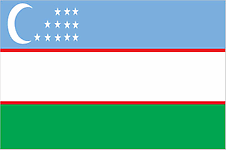Uzbekistan#
Russia conquered the territory of present-day Uzbekistan in the late 19th century. Stiff resistance to the Red Army after the Bolshevik Revolution was eventually suppressed and a socialist republic established in 1924. During the Soviet era, intensive production of "white gold" (cotton) and grain led to overuse of agrochemicals and the depletion of water supplies, which have left the land degraded and the Aral Sea and certain rivers half dry. Independent since 1991, the country has lessened its dependence on the cotton monoculture by diversifying agricultural production while developing its mineral and petroleum export capacity and increasing its manufacturing base. However, longserving septuagenarian President Islom KARIMOV, who rose through the ranks of the Soviet-era State Planning Committee (Gosplan), remains wedded to the concepts of a command economy, creating a challenging environment for foreign investment. Current concerns include post-KARIMOV succession, terrorism by Islamic militants, economic stagnation, and the curtailment of human rights and democratization.

